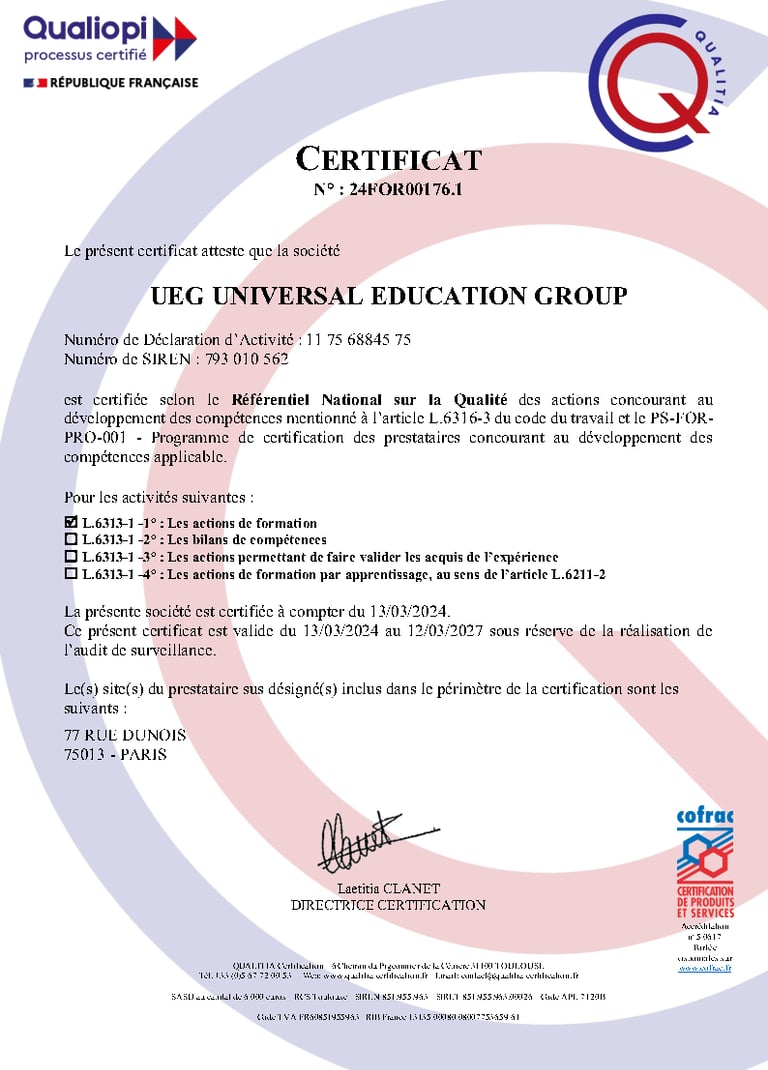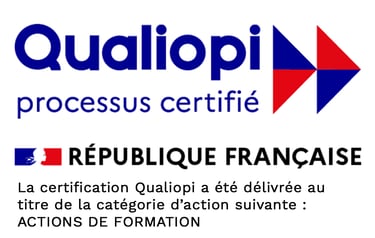QUALITY CERTIFICATION - QUALIOPI
OUR COMMITMENT
In the complex and competitive landscape of higher education, the quality of education has become a major stake. Educational institutions are constantly under the spotlight, evaluated not only by students and their parents, but also by employers and accreditation bodies. It was against this backdrop that ILCI Business School took the strategic decision to obtain Qualiopi certification, a quality mark issued by the French government.
This reflects ILCI Business School's deep commitment to academic excellence and student satisfaction. By obtaining this certificate, the school demonstrates its ability to meet the highest standards for teaching and professional training.
In addition to obtaining the certificate, the school has made a long-term commitment to continuous improvement of its processes and teaching practices.
article written on 20-03-2024
The initial Qualiopi certification process according to version V9, the most recent and most demanding to date, checks the implementation of quality actions in real-life situations, with demonstration of results.


QUALIOPI
Qualiopi is much more than just a certification. It's a guarantee of quality, a symbol of trust and proof of commitment to excellence in the field of professional training. But what exactly is Qualiopi, and what are the criteria and indicators verified to obtain it?
Qualiopi is a quality certification mark for training providers. It was created in 2019 by the French Ministry of Labor with the aim of harmonizing quality requirements across the country. This certification is compulsory for all providers of competency development programs wishing to benefit from public or mutualized funds.
Qualiopi's 7 quality criteria
Qualiopi certification is based on the National Quality Reference System (RNQ), which comprises 7 quality criteria divided into 32 indicators. Each of these criteria is essential to guarantee the quality of the services offered by training organizations.
Public information conditions : This criterion assesses the transparency and accuracy of information provided to the public on the services offered, the timeframes for accessing them and the results obtained. It includes 3 verified indicators, such as communication on services, access procedures and expected results.
Precise identification of objectives and adaptation to beneficiaries : This criterion concerns the training organization's ability to offer services tailored to the needs and expectations of beneficiaries. It comprises 5 indicators, including the analysis of needs prior to the service and the adaptation of services to the beneficiaries.
Adequacy of teaching, technical and supervisory resources : This criterion assesses the quality and relevance of the resources used to deliver the service. It includes 7 indicators, such as the quality and maintenance of equipment, the relevance of teaching aids and the methods used to monitor the provision of the service.
Staff knowledge and skills development and qualification : This criterion concerns the skills and expertise of trainers and supervisory staff. It comprises 4 indicators, including verification of trainers' qualifications and experience, and regular assessment of their skills.
Reception conditions and public guidance : This criterion assesses the training organization's ability to receive and accompany students in conditions conducive to their success. It includes 4 indicators, such as accessibility of premises and equipment, and individualized support for trainees.
The service provider's involvement and investment in its professional environment : This criterion evaluates the training organization's involvement in its professional environment and its ability to question itself. It includes 3 indicators, such as monitoring of developments in the sector and participation in professional networks.
Collection and consideration of feedback and complaints : This criterion concerns the training organization's ability to take into account feedback from beneficiaries and improve its services accordingly. It comprises 4 indicators, such as the collection and analysis of feedback and the implementation of improvement actions.
Conclusion
To sum up, Qualiopi is a demanding certification that attests to the quality of the processes implemented by providers of skills development initiatives. The 7 criteria and 32 verified indicators cover all aspects of the training activity, from public information and continuous improvement to the qualification of trainers and the adequacy of teaching resources. Obtaining and maintaining Qualiopi certification therefore represents a strong commitment to quality and excellence in the field of vocational training.
In summary, we are certified Qualiopi V9 until 12/03/2027.


ABOUT ILCI
ILCI Business School Paris is both a business school in Paris and a language center offering various Bachelor, MBA and DBA courses.
We offer programs in Management, Marketing, Communications, Digital, Logistics, Luxury Goods and Tourism.
Learning languages to develop your international career. ILCI teaches French as foreign language.
ADRESS
Campus Véronèse – 4 rue Véronèse
Campus Dunois – 77 rue Dunois
Campus Véronèse is open from Monday to Friday, 9:00 am to 5:00 pm.
INSTITUT DE LANGUES ET DE COMMERCE INTERNATIONAL
Etablissement d’Enseignement Supérieur Privé
© COPYRIGHT - ILCI- TOUS DROITS RESERVES - Mentions légales


Version 9 - Certificat N°24FOR00176.1 valable jusqu'au 12/03/2027
CONTACT US
Application for a teaching positon
Academic Partnership Projects


